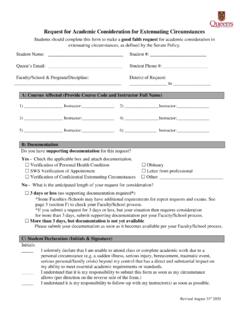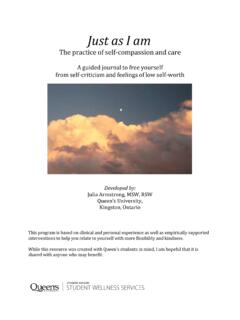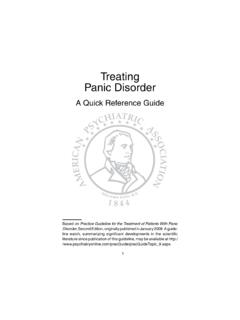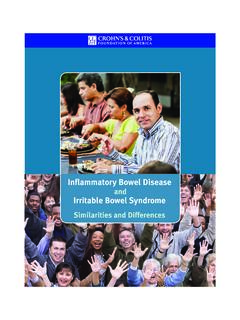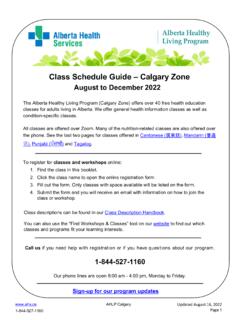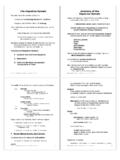Transcription of Understanding Stress: Signs, Symptoms, Causes, and Effects
1 Understanding Stress: Signs, Symptoms, Causes, and Effects We all face different challenges and obstacles, and sometimes the pressure is hard to handle. When we feel overwhelmed or unsure how to meet the demands placed on us, we experience stress. In small doses, stress can be a good thing. It can give you the push you need, motivating you to do your best and to stay focused and alert. Stress is what keeps you on your toes during a presentation at work or drives you to study for your exam when you'd rather be watching TV. But when the going gets too tough and life's demands exceed your ability to cope, stress becomes a threat to both your physical and emotional well-being. What is Stress? Stress is a psychological and physiological response to events that upset our personal balance in some way.
2 When faced with a threat, whether to our physical safety or emotional equilibrium, the body's defenses kick into high gear in a rapid, automatic process known as the fight-or- flight response. We all know what this stress response feels like, heart pounding in the chest, muscles tensing up, breath coming faster, and every sense on red alert. The Body's Stress Response The fight-or-flight stress response involves a cascade of biological changes that prepare us for emergency action. When danger is sensed, a small part of the brain called the hypothalamus sets off a chemical alarm. Stress hormone races through the bloodstream, readying us to either flee the scene or battle it out. Heart rate and blood flow to the large muscles increase so we can run faster and fight harder.
3 Blood vessels under the skin constrict to prevent blood loss in case of injury, pupils dilate so we can see better, and our blood sugar ramps up, giving us an energy boost and speeding up reaction time. At the same time, body processes not essential to immediate survival are suppressed. The digestive and reproductive systems slow down, growth hormones are switched off, and the immune response is inhibited. The biological stress response is meant to protect and support us. It's what helped our ancestors survive the life-or-death situations they commonly faced. But in the modern world, most of the stress we feel is in response to psychological rather than physical threats. Whether we're stressed over a looming deadline, an argument with a friend, or a mountain of bills, the warning bells ring.
4 And just like a caveman confronting a sabretooth tiger, we go into automatic overdrive. If you have a lot of responsibilities and worries, you may be running on stress a good portion of the time launching into emergency mode with every traffic jam, phone call from the in-laws, or segment of the evening news. But the problem with the stress response is that the more it's activated, the harder it is to shut off. Instead of leveling off once the crisis has passed, your stress hormones, heart rate, and blood pressure remain elevated. Furthermore, extended or repeated activation of the stress response takes a heavy toll on the body. Prolonged exposure to stress increases your risk of everything from heart disease, obesity, and infection to anxiety, depression, and memory problems.
5 Because of the widespread damage it can cause, it's essential to learn how to deal with stress in a more positive way and reduce its impact on your daily life. Signs and Symptoms of Stress To get a handle on stress, you first need to learn how to recognize it in yourself. Stress affects the mind, body, and behavior in many ways all directly tied to the physiological changes of the fight-or-flight response. The specific signs and symptoms of stress vary widely from person to person. Some people primarily experience physical symptoms, such as low back pain, stomach problems, and skin outbreaks. In others, the stress pattern centers on emotional symptoms, such as crying or hypersensitivity. For still others, changes in the way they think or behave predominates.
6 The following table lists some of the common warning signs and symptoms of stress. Use it to identify the symptoms you typically experience when you're under stress. If you know your red flags, you can take early steps to deal with the stressful situation before it or your emotions . spiral out of control. Stress Warning Signs and Symptoms Cognitive Symptoms Emotional Symptoms Memory problems Moodiness Indecisiveness Agitation Inability to concentrate Restlessness Trouble thinking clearly Short temper Poor judgment Irritability, impatience Seeing only the negative Inability to relax Anxious or racing thoughts Feeling tense and on edge . Constant worrying Feeling overwhelmed Loss of objectivity Sense of loneliness and isolation Fearful anticipation Depression or general unhappiness Physical Symptoms Behavioral Symptoms Headaches or backaches Eating more or less Muscle tension and stiffness Sleeping too much or too little Diarrhea or constipation Isolating yourself from others Nausea, dizziness Procrastination, neglecting Insomnia responsibilities Chest pain, rapid heartbeat Using alcohol, cigarettes, or drugs to Weight gain or loss relax Skin breakouts (hives, eczema) Nervous habits ( nail biting, pacing).
7 Loss of sex drive Teeth grinding or jaw clenching Frequent colds Overdoing activities ( exercising, shopping). Overreacting to unexpected problems Picking fights with others Keep in mind that the signs and symptoms of stress can also be caused by other psychological and medical problems. If you're experiencing any of the warning signs of stress, it's important to see a doctor for a full evaluation. Your doctor can help you determine whether or not your symptoms are stress-related. Causes of Stress Top Ten Stressful Life Events 1. Spouse's death 2. Divorce 3. Marriage separation 4. Jail term 5. Death of a close relative 6. Injury or illness 7. Marriage 8. Fired from job 9. Money concerns 10. Retirement The potential causes of stress are numerous and highly individual.
8 What you consider stressful depends on many factors, including your personality, general outlook on life, problem-solving abilities, and social support system. Something that's stressful to you may not faze someone else, or they may even enjoy it. The pressures and demands that cause stress are known as stressors. We usually think of stressors as being negative, such as an exhausting work schedule or a rocky relationship. However, anything that forces us to adjust can be a stressor. This includes positive events such as getting married or receiving a promotion. Regardless of whether an event is good or bad, if the adjustment it requires strains our coping skills and adaptive resources, the end result is stress.
9 Major Life Changes Major life events are stressors. Whether it be a divorce, a child leaving home, a planned pregnancy, a move to a new town, a career change, graduating from college, or a diagnosis of cancer, the faster or more dramatic the change, the greater the strain. Furthermore, the more major life changes you're dealing with at any one time, the more stress you'll feel. Daily Hassles and Demands While major life changes are stressful, they are also relative rarities. After all, it's not every day that you file for divorce or have a baby. However, you may battle traffic, argue with your family members, or worry about your finances on a daily basis. Because these small upsets occur so regularly, they end up affecting us the most.
10 Daily causes of stress include: Environmental stressors Your physical surroundings can set off the stress response. Examples of environmental stressors include an unsafe neighborhood, pollution, noise (sirens keeping you up at night, a barking dog next door), and uncomfortable living conditions. For people living in crime-ridden areas or war-torn regions, the stress may be unrelenting. Family and relationship stressors Problems with friends, romantic partners, and family members are common daily stressors. Marital disagreements, dysfunctional relationships, rebellious teens, or caring for a chronically-ill family member or a child with special needs can all send stress levels skyrocketing. Work stressors In our career-driven society, work can be an ever-present source of stress.







